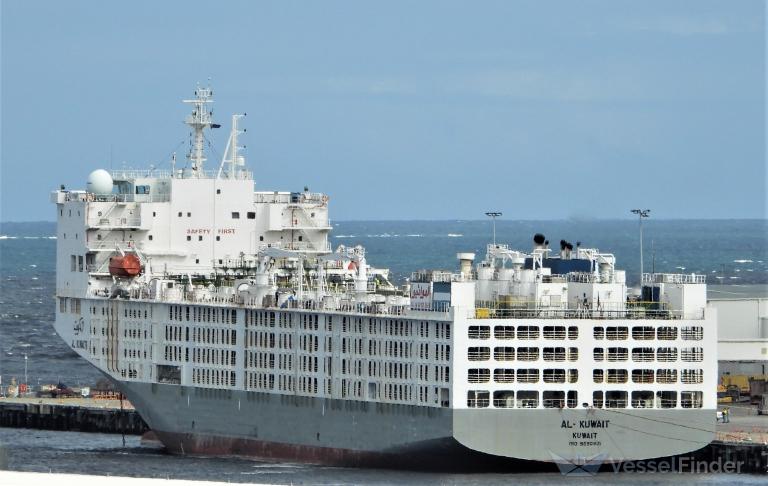Why does Cape Town smell so bad lately? It’s because of cows.

Cape Town, a picturesque South African city known for its natural beauty, recently experienced an overpowering foul smell that left locals and visitors alike holding their noses. The source of this vile odor? A ship filled with thousands of cows.
The stench became noticeable to residents and visitors alike, with many describing it as “unimaginable” and “nauseating.” The hot summer weather only exacerbated the situation, making the smell even more unbearable. Locals found themselves stuck in traffic, unable to escape the smell even with their windows rolled up.
The Source of the Foul Smell
Upon closer inspection, the source of the overwhelming odor in Cape Town was discovered to be the Al Kuwait livestock carrier, which was docked in the city’s harbor. This ship, registered in Kuwait, was on a long journey from the Port of Rio Grande in Brazil to Iraq, with a stopover in Cape Town to replenish its feeding stocks for the cattle on board.
The Al Kuwait, a massive 623-foot-long vessel, was carrying a staggering 19,000 cows, all confined within cramped and poorly ventilated holding pens across several decks. These pens were discovered to be covered in a thick layer of feces and ammonia, which had accumulated over the 2½ weeks that the animals had been on board. The combination of feces and ammonia created an “unimaginable” stench, according to the NSPCA inspectors who boarded the ship.

The conditions on board the Al Kuwait were described as “awful” and “inhumane”, with the animals being subjected to extreme discomfort and suffering. The buildup of feces and ammonia was not only a source of the foul smell that engulfed Cape Town but also a serious health hazard for both the animals and the crew on board.
It’s important to note that these conditions are not unique to the Al Kuwait; rather, they are indicative of the broader issues surrounding the live export of animals by sea. Such vessels often lack proper ventilation and hygienic conditions, leading to the accumulation of waste and the spread of disease among the animals. Additionally, the animals are at risk of being trampled or injured during rough sea voyages, and the ships rarely have an onboard veterinarian to attend to their needs.
The Impact on Residents
The overwhelming stench that filled the air in Cape Town had a profound impact on the daily lives of its residents. Lerato Bashing, a 29-year-old resident, described it as the worst smell she had ever encountered. She told the BBC, “It ruined my day because even when I was indoors, every time the lift opened, the smell spilled over into the office and it stuck in the back of my throat like a bad aftertaste.”
Another resident, who works near the harbor, shared a similar sentiment. They described the smell as “overwhelming” and said they were forced to close their car windows, despite the hot day. “It smelled as bad as one you’d imagine and I was put off of breathing,” they said.
While the stench was most noticeable in the port city, many residents wondered how the crew onboard the ship were faring. They had spent about two weeks with the cattle in the same environment. “I feel sorry for the workers on that carrier who have to be around that every day and for the animals,” said Lerato Bashing.
The impact of the stench was not limited to the immediate area surrounding the harbor. Residents reported that the smell had not reached the other side of Table Mountain or the southern suburbs, indicating that the wind direction and topography played a role in the distribution of the odor.
NSPCA’s Response
The National Society for the Prevention of Cruelty to Animals (NSPCA) has long been an advocate for the humane treatment of animals and has been particularly vocal against the live export of animals by sea. The organization seized the opportunity presented by the stench in Cape Town to reiterate its stance on this contentious issue.
NSPCA’s opposition to live animal exports by sea is rooted in concerns about the welfare of the animals involved. Sea voyages can be long and arduous, with animals confined to cramped and often unsanitary conditions. The NSPCA has documented instances of animals suffering from dehydration, exhaustion, and even death during these voyages. Additionally, the organization has raised concerns about the lack of veterinary care and the potential for injuries and diseases to go untreated.
Furthermore, the NSPCA has been critical of the conditions on board livestock carriers which often lack proper ventilation and can become hot and humid. These conditions can exacerbate the animals’ discomfort and contribute to the buildup of feces and ammonia, which can lead to unpleasant odors like the one experienced in Cape Town.
In light of these concerns, the NSPCA has called for stricter regulations and oversight of the live export industry. The organization has advocated for measures to improve the conditions on board livestock carriers, such as ensuring proper ventilation and access to water, as well as the presence of onboard veterinarians. The NSPCA has also called for greater transparency and accountability in the industry, with a focus on ensuring that animals are transported in a humane and ethical manner.










